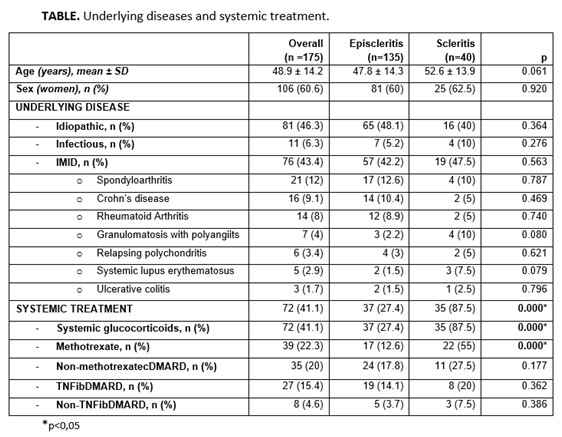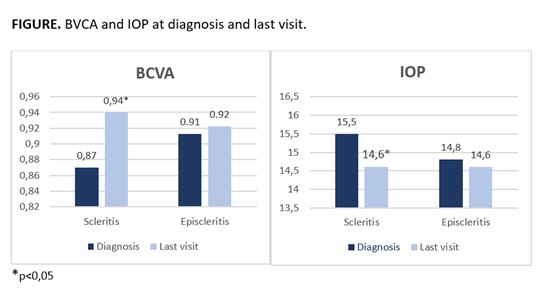Session Information
Date: Monday, November 8, 2021
Session Type: Poster Session C
Session Time: 8:30AM-10:30AM
Background/Purpose: Ocular scleral pathology (OSP) includes episcleritis and scleritis. Episcleritis is generally a benign disease with a self-limited course, while scleritis is a more severe ocular condition. In some severe and refractory cases systemic therapy may be required.
In a wide series with OSP our aim was to assess a) underlying diseases and b) systemic treatment.
Methods: Study of unselected all consecutive patients studied in a single University Hospital during the last ten years with: a) episcleritis and b) scleritis diagnosed by clinical features and slit-lamp (Watson and Hayreh criteria). Best corrected visual acuity (BCVA) and intraocular pressure (IOP) were measured at diagnosis and after systemic treatment.
Results: We studied 175 patients (106 women/ 69 men) /212 affected eyes with OSP (episcleritis=135; scleritis=40); mean age 48.9±14.2 years.
OSP was unilateral in 138 (78.9%), recurrent in 74 (42.9%) and chronic in 21 (12%). Most of them were idiopathic (n=81, 46.3%) while associated with IMID were 43.4% (TABLE). The most important underlying IMID were spondyloarthritis and inflammatory bowel disease, without significant differences between scleritis and episcleritis. Granulomatosis with polyangiits and systemic lupus erythematosus were more frequent in scleritis, not reaching statistical significance.
Regarding treatment, topical treatment was used in all patients. 41.1% received systemic treatment, including systemic glucocorticoids, cDMARDS and bDMARDs. Systemic glucocorticoids and Methotrexate were used more frequently in scleritis (TABLE). The main indication for biologic therapy was related to underlying IMID in both groups, but 7 bDMARDs in scleritis were indicated for systemic and ocular compromise.
BVCA and IOP improved significantly after systemic treatment in scleritis (FIGURE).
Conclusion: OSP is a relatively frequent entity. It is necessary to exclude an underlying systemic disease to establish correct systemic treatment.
To cite this abstract in AMA style:
Sánchez-Bilbao L, Calvo-Río V, Martin-Varillas J, Álvarez-Reguera C, Herrero-Morant A, Gonzalez-Mazon I, Demetrio-Pablo R, gonzalez-Gay M, Blanco R. Ocular Scleral Pathology: Clinical Features and Systemic Treatment in 175 Patients from a Single University Center [abstract]. Arthritis Rheumatol. 2021; 73 (suppl 9). https://acrabstracts.org/abstract/ocular-scleral-pathology-clinical-features-and-systemic-treatment-in-175-patients-from-a-single-university-center/. Accessed .« Back to ACR Convergence 2021
ACR Meeting Abstracts - https://acrabstracts.org/abstract/ocular-scleral-pathology-clinical-features-and-systemic-treatment-in-175-patients-from-a-single-university-center/


